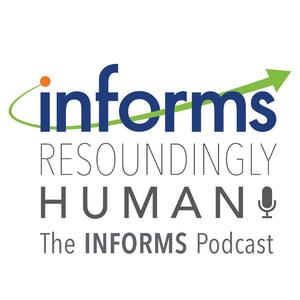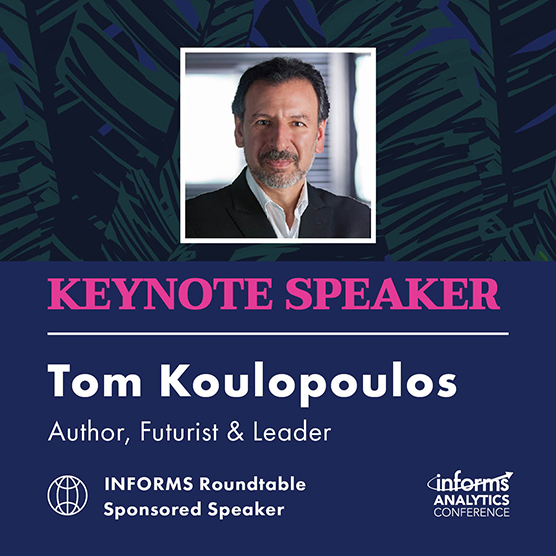Published: March 16, 2024

Today’s guest is going to help us explore the fun side of data analytics! Evan Wimpey is not only an analytics professional with Elder Research but is also a stand-up comedian! After spending years analyzing data and delivering statistical models, Evan realized that humor is often the most effective way to make dry or technical topics more accessible … and more fun! Now in addition to his analytics day job, he performs data science comedy at conferences and events around the world, to include the upcoming 2024 INFORMS Analytics Conference, April 14-16 in Orlando, FL.
We’ve got really smart people that I work with that build these really great tools that help people make decisions and it’s still hard to get people to use them, and it’s still hard to get people to engage in analytics and want to change the way they do things. Just like people remember more news from the Colbert Report than they do from CNN, people remember some laughs and some jokes and if we can make things a little more fun than it can drive the more serious part of our work.
Interviewed this episode:

Evan Wimpey
Elder Research
Evan Wimpey is an analytics professional and stand-up comedian. Yes, dreams really do come true! With a background in statistics and economics, Evan has spent years analyzing data and delivering statistical models. Since the topic can be quite dry and technical, Evan has realized that humor is often the most effective way to make analytics more accessible…or at least the most fun way. He performs data science comedy at conferences and events around the world. With his book, Predictable Jokes, Evan hopes to continue sharing laughs and making analytics available to all.
Related Episodes
Episode Transcript
Ashley K: My guest today is going to help us explore the fun side of data analytics. Evan Wimpy is not only an analytics professional with elder research, but is also a standup comedian. After spending years analyzing data and delivering statistical models, Evan realized that humor is often the most effective way to make dry or technical topics more accessible and more fun. Now, in addition to his analytics day job, he performs data science comedy at conferences and events around the world to include the upcoming 2024 INFORMS analytics conference April 14th through the 16th in Orlando, Florida. Evan, thank you so much for joining me. It’s great to have you on Resoundingly human.
Evan Wimpey: Ashley, thanks so much for having me on the show and for relaxing your standards on what you count as human to be on the show.
Ashley K: Not at all, my goodness. Okay, you already have me laughing.
Evan Wimpey: That’s all I got. Okay, let’s close it now. Well, we’re done.
Ashley K: That’s a wrap. Alright, Evan, let’s start with a little background on your analytics career. Tell us a bit about the more serious side of the work that you do.
Evan Wimpey: Okay, sure. Fantastic. I try to keep everything pretty light, so not too serious. Which funny, because my background is in the Marine Corps. I was in the Marines before I was in analytics, got out, went to school to get a master’s in analytics, came here to elder research, which is where I work now as a data scientist. It’s a bit confusing. Elder research is we don’t actually do elder and we actually don’t really do research either. We just founded by a guy named Dr. John Elder. That’s like Salmon City doesn’t actually serve salmon. But at elder research as data scientist for a few years now, my role is director of analytics strategy, which is as sort of ambiguous as it sounds, but at elder research, maybe this is just my tagline for us, but if you have data and you want to make decisions, we like to help you do that.
And it’s been around for about 30 years. So 30 years ago if you wanted an analytics consultant, we were one of one. Now we are one of a whole lot. The space has gotten a lot more dense. Our Maha Nobus distance has shrunk to our competitors. But in the space we like to think, we don’t like to solve the cookie cutter problems, the plug and play problems. We like to solve the complex, the creative types of problems, and I love to get a chance to do that. I love doing that as a data scientist. And now my role is sometimes hands-on code hands-on data, trying to deliver solutions. More often it’s sort of client engagement. How do we get solutions implemented, get things so that folks can actually use them and drive some better decisions. And then a lot of what I do is sort of maps closely to a technical pre-sales role where folks that are interested in what data and analytics can do and need some help, trying to think about what can the older research team help do to drive that? Trying to build that up, to mock that up and hopefully engage some folks with some laughs when I can. So
Ashley K: Evan as a Marine Corps brat who grew up with the Marine Corps dad, I want to thank you for your service.
Evan Wimpey: Hoorah. Alright,
Ashley K: Hoorah. That’s right. Okay. Alright. So when did you get the idea to combine humor with data and how did this evolve into your becoming a standup comedian?
Evan Wimpey: So I’ve done a little little bit of standup comedy back in the undergrad days 20 years ago. And part of my role at Elder Research, I do some teaching and I like to try to inject some humor into what’s generally like a Stein economics course, like dry material. But I would say sort of the light bulb went off at the beginning of Covid on our internal messaging, we use Slack and somebody shared a post about a conference. They were going, a statistics conference from the Cause Consortium of Undergraduate Statistics Education, I don’t know, something like that. But they had a competition for you could submit a joke, a song, a poem, something fun related to data. And I was sitting at the playground watching the kids play thinking through possible data jokes. Submitted a couple and I actually won first prize. And my colleagues are the first to ask you how many people actually submitted a joke, Evan, that you won first prize.
But I did won first prize. It got a nominal cash prize, which made me technically a professional statistics comedian. And I just absolutely wore that title out, just telling jokes all the time and the cornier the better, thinking Up new statistics jokes sort of had this bootstrap audience of my colleagues that I just tell jokes all the time and my poor wife and kids that just have to listen to these jokes all the time. But eventually I got enough that I thought this was good. I can share with some clients and I’m in front of clients pretty often already and open with a few stats jokes and then the joke portion got longer and got a higher proportion until I thought maybe I could just do this regularly. And so last year at Machine Learning Week is a conference that I was speaking at actual machine learning talk, but I offered, Hey, I can tell some jokes too if you want. And so actually that conference was the first time outside of elder research clients that I pulled some data science jokes and it went well enough. It went well enough that I want to keep doing it and people have invited me to do it some more. So conferences, universities, clients that want to spruce up a team meeting. I like to come in and get things started with a little bit of light nerd jokes.
Ashley K: So it sounds like hopefully you still get to insert data humor into your day-to-Day analytics work too.
Evan Wimpey: I do, and I make an effort to, and perhaps I err on the side of too many jokes to make sure he take seriously the work that we do. But I think in all seriousness, we’ve got really smart people that I work with that build these really great tools that help people make decisions. And it’s still hard to get people to use them and it’s still hard to get people to engage in analytics and want to change the way they do things. And just like people remember more news from the Colbert Report than they do from CNN, people remember some laughs and some jokes. And if we can make things a little bit more fun, then it can drive the more serious side of our work too, I think.
Ashley K: So I’d love to take a look behind the scenes at your creative process. Where do you get the ideas for your jokes?
Evan Wimpey: Okay, this is I think sort of zoomed out. If you look at, I don’t have a special on Netflix yet, so you’re not going to find me there. But if you go to the top comedians that release their specials, it’s a lot of jokes about their life and their experiences and the things that they actually go through. And I try to be pretty similar in that roadmap. And I’m fortunate I’m in a position where I get to see lots of analytics projects across a pretty wide range of topics and context, and I use that as motivation for jokes when there’s a miscommunication in a meeting. I was in a sales meeting where we talked about SQL and in sales, I guess that’s a sales qualified lead. I didn’t know that. I thought it was structured query language, and so it was just, okay, that funny experience that I have in the real work that I do, I can turn that into a four minute bit about miscommunication and analytics.
And so I think just by virtue of the work that I do and what I’m around, I’ve got the context for it. We’ve all seen funny things. Anybody who’s been in analytics or whatever, your work is where you are, there are things that come up that are humorous. And the first instinct as a comedian might be, well, this is only funny to the small group of people who get this, well, luckily I’m only trying to tell jokes to the small groups of people who are going to be in analytics and data. And so that’s sort of who I’m trying to write for.
I almost think of it sort of like a storm chasing where there’s this stuff that’s out there and I know it’s going to be out there and I don’t even really know exactly what I’m looking for. Just want to immerse myself in the experience and try to take out the funny bits that I can find from it for the process. The commute, if you’re looking to get into comedy, don’t shy away from a commute. You want to have a nice long drive and just force yourself to turn the radio off, turn off the listen to the INFORMS podcast. But when you’re done with that, turn the radio off and just ride in silence where the only noise is like you yelling at the other drivers occasionally. And that sort of forced boredom is when the most frantic part of my day is when I get to the office and I okay, quick write down all the things that I just thought of on this long commute. But the commute for good creative thought I think is a useful place to be.
Ashley K: Well, Evan, speaking of podcasts, you also host one of your own mining your own business. I’d love to have you share some of the topics you tackle on that.
Evan Wimpey: Sure, I do. So this is the Mining Your Own Business podcast is the Elder Research podcast. So I’m the host, if you’re looking for comedy, it’s, I’ll try to inject a little bit of comedy as well to guests, but it’s not a humor focused podcast. So 2016, the president and the CEO of Elder Research wrote a book called Mining Your Own Business, and it’s meant as a primer for business leaders and executives who want to implement analytics, who want to use data. So it’s not super technical, it’s glosses over some analytic and data concepts, but generally it’s written for the business professional who wants to start using analytics. It’s almost like a bridge between the very technical and the business leadership folks. And so the podcast is really an extension of that book. I have guests on sometimes very technical data science, data engineering folks, sometimes business focused using analytics to help drive what they do. But the focus of all the conversations is on how to bridge that gap, how to use data science, what sort of roadblocks do you encounter, what sort of roadblocks are you trying to overcome, how do you overcome that, how do you build a team? How do you get analytics off the ground and into actual helpful space in your company?
Ashley K: Okay, so we have Elder Research day job, standup comedian, career podcasts, and you also have a book. Can you tell us a little bit about that?
Evan Wimpey: I do. Quick aside, I told some jokes at a conference in December last year, and I didn’t mention the book at all. And Dr. Michael Rappa, who leads the graduate program where I went to study analytics, spoke after me and he told me that I would just be a really terrible academic because I had an opportunity. I stood up in front of these people and I didn’t even mention that I had a book that’s not, you’d be so terrible in academia. So he actually plugged my book for me and I’m still just terrible about it today. I’m so glad that you asked because I’m supposed to put a plug for the book in. Yeah, as I started collecting these statistics, data analytics, nerdy jokes, I’m a data person, I kept a log of them with some tags for each of these and at some point I had a pretty good number and I thought, oh, I could put these into a book, did a little research.
You need 101 jokes to write a joke book or a thousand in one, but I’m not going to do a thousand in one. But when I made it close, that was now the goal. Get to 101 jokes. So I did published a book in, it’s been nearly a year, so it’s called Predictable Jokes. It’s 101 data-Driven laughs, and I am very happy with it. Publisher didn’t want to pick it up. I shopped it around a little bit. It is self-published, but it’s a standalone joke book. It’s 101, just standalone jokes ranging from a few of which my mom will get, and a few of which you probably want a graduate degree or you’re going to ask somebody like, what in the world is this distribution? So it’s ranging and nerdiness. They’re all nerdy, but they sort of range and technical complexity.
Ashley K: All right. So where can listeners go to find your book?
Evan Wimpey: Well, they can go to predictable jokes.com and that’s where you can find the book, the book’s also on Amazon. But you should go to predictable jokes.com because there you can see some recordings of me telling some jokes as well. And if you’re interested in me coming out to your event or your company, then you can get in touch with me there on predictable jokes.
Ashley K: Sounds great. We’ll include a link to that in our show notes too for listeners. Alright. When you aren’t telling math jokes, what do you do for fun? Do you have any surprising hobbies?
Evan Wimpey: I have found that doing comedy is, I didn’t expect it to be so much, but it has been a break for me. It has been like a reprieve, like this thing that I get to do to get away. And even though it was very much tied to my day job and what I do, nine to five, just the preparation of a performance, the getting up on stage, that’s sort of like the stroke of the ego, getting a few laps has been really enjoyable. And even if I weren’t doing analytics, I think I would try to keep doing comedy in some way. I do have a family with three young boys, we like to travel. We’re going to wrap up this podcast and when you listen to it, maybe I think we’ll be in the Far east in China or Japan. So I like to do a lot of travel with the family as well, and my poor family. Sometimes the wires get crossed and I’m telling analytics jokes with my family. We’re going to be on a plane together for 13 hours and they’re going to be ready. They’re going to have the Airbus in just, yeah, good jokes. Yeah, thanks. Thanks for the jokes.
Ashley K: You’ll have a captive audience to practice.
Evan Wimpey: Yes.
Ashley K: Alright, Evan, speaking of jokes, I think you know what I’m going to ask next. Can you tell us some of your favorite nerdiest math jokes?
Evan Wimpey: I can, I’ll tell a few. So I submitted this, the joke that got me off the ground, the one I submitted that won the first prize in this conference is a, did you hear about the Bayesian that built a model to tell her when she needs to go to the dentist? It said she didn’t need to go for six months, but that’s probably because she just had a week prior. Okay, that’s on my, you want at least an undergraduate class in Bayesian statistics there for that one. I’ll go with this. This one,
Ashley K: I’m sorry I wasn’t the audience for that, but I’m sure there are many lists.
Evan Wimpey: Well pull your car. If you’re listening in the car, pull over now. I don’t want it to be the cause of any accidents. You roll your eyes so hard that you swerve the steering wheel over. And so actually, this was a buddy of mine, he is a data analyst. He worked in New York City. He’s downtown and he’s feeling burned. I think it’s pretty common in this fast paced, fast moving environment. You’re just feeling really burned out. Said, I got to get away. So he took a long weekend and he went upstate New York, just get out of the city and he thought it would be relaxing. He just couldn’t handle it. He was walking around this forest and rivers and trees and he just couldn’t, didn’t feel comfortable, just didn’t feel like his normal self. And he went for a hike. One day he went walking and there was a place where the forest had been completely logged. He was totally deforested. There were no trees. And all of a sudden he felt much more comfortable, much more at home. He said, wow, after the log transformation, this feels much more normal.
Ashley K: I got that one.
Evan Wimpey: That’s what a small takes. Listen, elder research has made their mark on a target. Shuffling is a concept that Dr. John Elder invented, and it’s a way to validate models and validate statistical findings, and it’s super powerful. Target shuffling seems like it should be ripe for a joke. I’ve got all these Bayesian, all these statistics, jokes, all these AI machine learning jokes. I’ve yet to come up with a good one on target shuffling. So if the listeners have a good idea for a target shuffling joke, then feel free to reach out. I’ll give attribution, I promise.
Ashley K: All right, Evan, I’m feeling really intimidated, but I have a couple of jokes that are from both my own research into terrible jokes, my team, and even a little help from chat, GPT, so I can’t take credit for any of them, but if you’re willing to listen, I’ll share a couple. What do you call a number that can’t sit still? A roman numeral. All right, one more. One more. How does a math professor plow fields? With a protractor.
Evan Wimpey:
No, they’re great.
Ashley K: Thank you for your patience.
Evan Wimpey: Lemme just mention one other thing, folks that are concerned about what can get automated and what can large language models do. Comedy feels like a pretty safe space chat. GPT is writing some pretty good code for me to use. It’s formatting some documents really well for me. It’s yet to tell a new and funny joke, so I feel pretty good about maybe the last human profession here is,
Ashley K: Yes, yours were better than the ones that chat GPT came up with by far. Thank you, Evan. I’ve had an absolute blast talking with you. Thank you so much for joining me and sharing a humorous side of data analytics. I can’t wait to meet you in person soon at the 2024 and Forums Analytics conference. Before we wrap up, any parting thoughts or advice for our listeners on combining humor and analytics?
Evan Wimpey: Yeah, just do it. Just combine them. Take a serious subject and there’s no more serious subject than what we see on the news. And the best way people consume news is through comedy. People consume analytics through comedy as well. So don’t be afraid if you’re delivering a talk, if you’re teaching people, if you’re presenting some analytics, don’t be afraid to sprinkle in some jokes. Make the humor yours.
Ashley K: That’s terrific advice. Thank you so much.
Evan Wimpey: Thanks Ashley. So happy to be on the show.
Want to learn more? Check out the additional resources and links listed below for more information about what was discussed in the episode.
2024 INFORMS Analytics Conference, April 14-16, in Orlando, FL
Tags: Analytics Conference, comedy, data analytics, data science, humor, jokes



